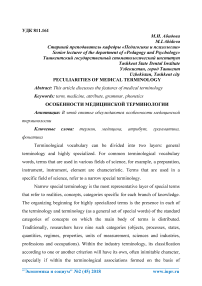Peculiarities of medical terminology
Автор: Abidova M.I.
Журнал: Экономика и социум @ekonomika-socium
Статья в выпуске: 2 (45), 2018 года.
Бесплатный доступ
This article discusses the features of medical terminology
Term, medicine, attribute, grammar, phonetics
Короткий адрес: https://sciup.org/140236238
IDR: 140236238
Текст научной статьи Peculiarities of medical terminology
Terminological vocabulary can be divided into two layers: general terminology and highly specialized. For common terminological vocabulary words, terms that are used in various fields of science, for example, a preparation, instrument, instrument, element are characteristic. Terms that are used in a specific field of science, refer to a narrow special terminology.
Narrow special terminology is the most representative layer of special terms that refer to realities, concepts, categories specific for each branch of knowledge. The organizing beginning for highly specialized terms is the presence in each of the terminology and terminology (as a general set of special words) of the standard categories of concepts on which the main body of terms is distributed. Traditionally, researchers have nine such categories (objects, processes, states, quantities, regimes, properties, units of measurement, sciences and industries, professions and occupations). Within the industry terminology, its classification according to one or another criterion will have its own, often inimitable character, especially if within the terminological associations formed on the basis of universal categories of concepts, to isolate thematic groups. And the very number of these categories can vary depending on the degree and completeness of coverage by the industry terminology of the relevant field of knowledge.
The formation of modern medical terminology is associated not only with its initial lexical basis, and even not only with the content of the relevant concepts, but also with those social changes that occur both in the world as a whole and in individual countries that have established medical schools.
Having much in common with the terminology of the natural sciences, medical terminology, nevertheless, has its own specific characteristics:
-
1. The basis of medical terminology is borrowed Greek-Latin terms or terms created artificially from Greek-Latin terminological elements. In English, about 95% of the terms are based on classical languages. Equally important are classical languages in Russian medical terminology. In addition, the anatomical and histological nomenclatures included in medical terminology are compiled entirely in Latin, on the basis of its alphabet, phonetics and grammar.
-
2. Since the Greek-Latin terms underlie the medical terminology of almost all European languages, most medical terms are international. In the professional medicine language of any country in the world, some special expressions are used only in Latin. For example: in vivo, in vitro, per os, etc.
-
3. Active creation of terms from classical terminological elements led to a conscious influence on terminology: medical terms have a high degree of motivation and are semantically transparent.
-
4. To replenish terminology, the eponyms (eponym (from the Greek epōnymos giving the name giving something to its name)) are actively used terms. Such a situation Grinev S.V. explains that not always a certain disease can be attributed to a specific nosological (nosology (from Greek nosos disease + logos science) - a section of pathology that studies the nature and nature of the course of individual diseases, including their description (nosography), and also develops
their classification by similar signs, the nosological - related to nosology. [13]) form.
To avoid a false orientation of the term, it is preferable to leave it "neutral", that is, to give the name of the disease by the name that described its researcher. With the passage of time, when it is possible to clarify the etiology or the main aspects of the pathogenesis of the disease, a new term appears that gives a more accurate idea of the attribution of this concept to a particular class, and therefore the eponymic term, as a rule, is superseded or remains in memory of the scientist.
If we talk about syntactic models used as terms, in most cases these models are in two versions: substantive and attributive. The nominal character of the word-combinations is supplemented by participial turns and participles with nouns: progressive myopia; artery accompanying the sciatic nerve. In the role of the substantive component can act: nouns of Russian origin (tubercle, deposition, stone, tabs, bite); nouns of Greek-Latin origin (stomatitis, odontoma, index, adentia); nouns borrowed from other languages (enamel, filling, sinusitis).
Numerous groups are terminological word combinations, which include two attributive components (chronic active hepatitis, the osteal cyst, external iliac artery). For substantive terminological word combinations, the following models are characteristic: noun im. + noun r.p. ; (Werlhof's disease, Quincke's edema, stomach resection, Frohlich syndrome, brain embolism, lung abscess, Eismarch's mug); adjective (participle) + noun im.p. + noun rp; (transverse position of the fetus, closed cardiac massage, spontaneous rupture of the uterus); noun and etc. + adjective (participle) + noun rp; (disease of the cecum, nosoresnichnogo nerve syndrome, the device of artificial circulation, prosthetics of the mitral valve); noun and etc. + noun r.p. + noun rp; (muscle spasm of the extremities, fracture of the diaphysis of the hip, cervical cancer).
Список литературы Peculiarities of medical terminology
- Аксенова Г.Н., Кожухова Н.Е., Шарапа А.А. Особенности лингвистического и логико-понятийного аспектов изучения медицинских терминов//http://www.bsmu.by/bmm/04.2004/42.html.
- Валгина Н.С. Современный русский язык/Валгина Н.С., Розенталь Д.Э., Фомина М.И.-М.: Логос, 2002. -528 с.
- Иллюстрированный энциклопедический словарь М.: Ридерз-Дайджест 2003.-424 с.


